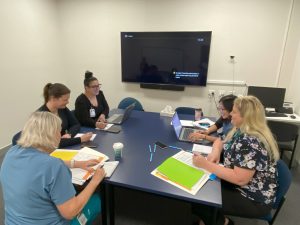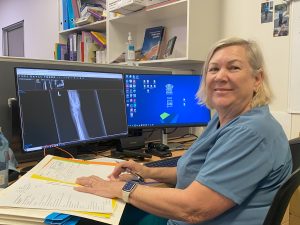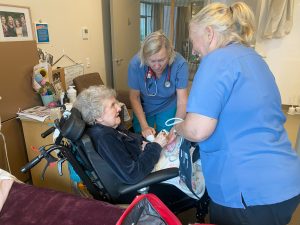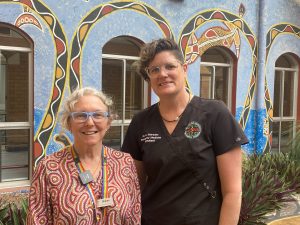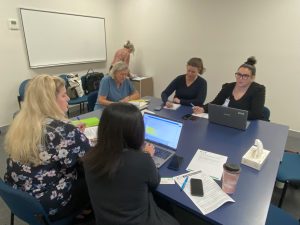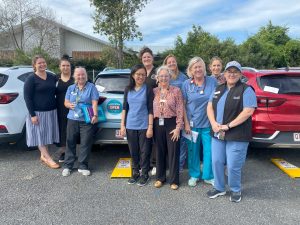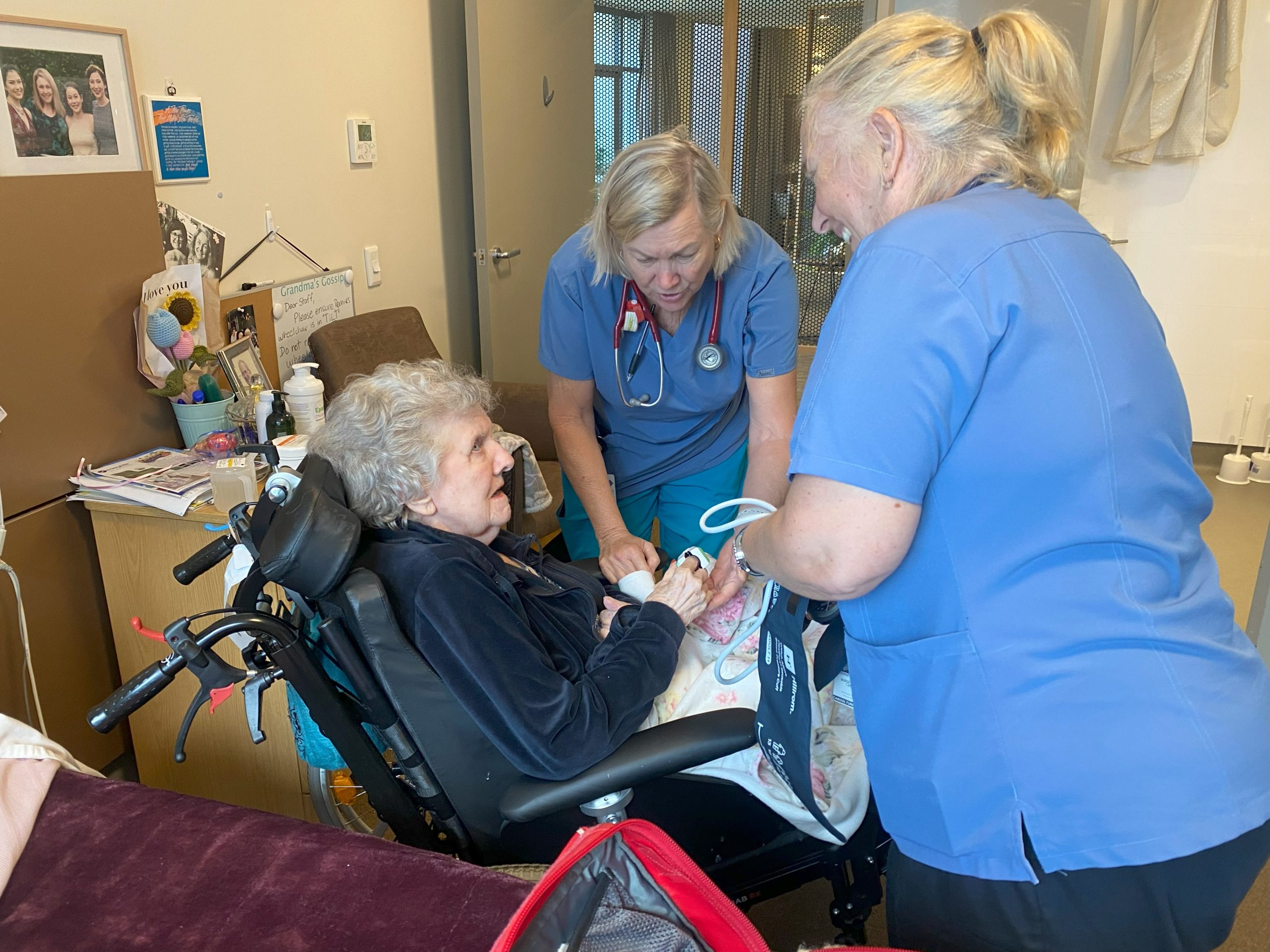
OPEN-ing the door to care
An innovative Queensland Health initiative has improved emergency care for older people living Residential Aged Care Facilities (RACF) in the Metro North Hospital and Health Service and has recently extended into community outreach.
Emergency physician and Clinical Director, Dr EJ Marsden said the Older Persons Emergency Network (OPEN) program and its forerunner, the Geriatric Emergency Department Intervention (GEDI), were proving highly successful in reducing patient stress.
Since inception, GEDI has been implemented in 17 EDs across Queensland. The initiative has received funding from the Emergency Medicine Foundation (EMF) to assess and quantify its impact. OPEN is based at Caboolture Hospital and provides outreach services across the Metro North region.
“The evaluative research we conducted found that when older adults presented to ED during the times the GEDI team was working, they were more likely to be discharged, and if admitted they spent on average 24 hours less in hospital and the costs of their care were reduced by up to 30 per cent,” Dr Marsden said.
“GEDI was based in the ED, and I realised there were patients who needed care but didn’t need to come to the ED and we could provide that by going to their homes. That’s how we developed outreach and the OPEN program.
“The EMF grant provided me with the clinician time to put a team together to investigate further and allowed us to do scale and spread.”
Dr Marsden says further EMF funding is enabling the team to evaluate OPEN provided in RACFs and has contributed to the establishment of new components including the fracture clinic, nurse practitioner services, nurses in the Queensland Ambulance Service (QAS) emergency services hub, and Aboriginal and Torres Strait Islander health care worker co-responder collaboration.
She said the service benefitted both patients and the healthcare system, allowing older people to avoid emergency departments and reducing the burden on over-subscribed EDs and hospital resources for long-stay patients.
“Patients and families have also been providing us with feedback on the outreach program and they can’t be more grateful.
“There has been a lot of discussion about how distressing it is to move an older person from the safe, warm environment of their home and bringing them into the ED with the lights, the sirens, the noise. We’re really thankful to EMF for this opportunity.”
New research focus on older people
Research involving healthcare for older people in Australia has traditionally focused on aged care facilities, Dr Marsden says.
“There isn’t a lot of other research being done in the area of community outreach and going to people in their homes, but I know of some in the UK and we’re hoping to collaborate with the researchers.”
The OPEN team works closely with the QAS and has Clinical Nurse Consultants based at the emergency call centre hub. Cases suitable for home visits are identified and ‘mobile emergency departments’ in the form of a doctor or nurse practitioner and a vehicle equipped with a range of observational, diagnostic equipment as well as wound, suturing and plastering supplies are dispatched.
Acute illness and injuries such as fall-related trauma and end of life cares can be treated by the mobile ED staff. More serious conditions like compound fractures and sepsis requiring transport to hospital are treated by QAS paramedics.
Nurse practitioner, Michelle Afflick said OPEN’s multidisciplinary team was a major contributor to the success of the program in providing excellence in patient care.
“For patients attending the fracture clinic, co-morbidities mean several clinicians are involved in care, including the geriatrician and the clinical pharmacists who look at all the medications and see what can be prescribed and look at risk versus benefit,” Ms Afflick said.
“With older people we’re focused on fall mitigation and some groups of medications can contribute to falls so we want to wean them out if they’re not required.”
She said delirium was also a prominent cause of patients needing emergency care so doing a ‘PITCH’ review to look for causes including pain, infection, thirst, constipation, hunger, environment, and drugs was common.
Co-design towards closing the gap
Dr Marsden said one of the most rewarding aspects of the OPEN program was working with Queensland Health’s Aboriginal and Torres Strait Islander healthcare workers on a co-design delivery model.
“We are looking at taking a healthcare worker with us to see Aboriginal and Torres Strait Islander patients who may have an acute illness or injury in their own homes and try to facilitate that care in a culturally sensitive way,” she said.
“It’s fantastic to be working towards closing the gap in the Caboolture region.”
Building research capacity
Building research capacity within the OPEN team is a key focus for Dr Marsden and clinical nurse consultant researcher Sharon Hodby is one of several team members working on emergency care research and evaluation.
“We are looking at the outcomes of OPEN and doing a deep dive into the data to see if we are delivering the benefits we think we are,” Ms Hodby said.
“We’re also looking at implementation processes and working with health economists from Griffith University to evaluate the program with the support of EMF.”
The team has successfully published in several journals, including papers on the impact of COVID on EDs and how to better manage a future pandemic in terms of older people and long-term health care.
Pharmacist June Chan has recently published a paper on the association between hospital-based residential aged care support service pharmacist-led medication review, and improved medication outcomes for residents.
Published journal papers
Wallis, M., Craswell, A., Marsden, E., Taylor, A., 2022. Establishing the Geriatric Emergency Department Intervention in Queensland emergency departments: a qualitative implementation study using the i-PARIHS model. BMC health services research, 22(1), 1-14.
Marsden, E., Craswell, A., Taylor, A., Barnett, A., Wong, P. K., Wallis, M., 2022. Translation of the geriatric emergency department intervention into other emergency departments: a post implementation evaluation of outcomes for older adults. BMC geriatrics, 22(1), 1-11.
Marsden, E., Craswell, A., Taylor, A., Coates, K., Crilly, J., Broadbent, M., Glenwright, A., Johnston, C. and Wallis, M., 2018. Nurse‐led multidisciplinary initiatives to improve outcomes and reduce hospital admissions for older adults: The Care coordination through Emergency Department, Residential Aged Care and Primary Health Collaboration project. Australasian journal on ageing, 37(2), pp.135-139.
Wallis, M., Marsden, E., Taylor, A., Craswell, A., Broadbent, M., Barnett, A., Nguyen, K.H., Johnston, C., Glenwright, A. and Crilly, J., 2018. The geriatric emergency department intervention model of care: a pragmatic trial. BMC geriatrics, 18(1), pp.1-9.
Marsden, E., Taylor, A., Wallis, M., Craswell, A., Broadbent, M., Barnett, A., Nguyen, K.H., Crilly, J., Johnston, C. and Glenwright, A., 2017. A structure, process and outcome evaluation of the Geriatric Emergency Department Intervention model of care: a study protocol. BMC geriatrics, 17(1), pp.1-8.
| EMF Grant |
Project Title
|
Total Funding |
| EMLE-260R40-2023 | A structures, process and outcome evaluation of the Residential Aged care District Assessment and Referral Rapid Response (RADAR RR) model. Leading Edge Grant |
$84,949.00 |
| EMSF-003COV-2020 | Patterns of Queensland Emergency Department presentations for older adults in three time periods: pre, peri and post COVID-19 Special Funding Round COVID-19 |
$37,431.00 |
| EMRS-61R29-2018 | Mixed methods study of the Geriatric Emergency Department Intervention (GEDI) Research Scholarship Grant |
$37,500.00 |
| EMPJ-381R27-2017 | Evaluation of the Geriatric Emergency Department Intervention (GEDI) implementation. Project Grant |
$100,000.00 |
SHARE



